From Mongo to Westeros
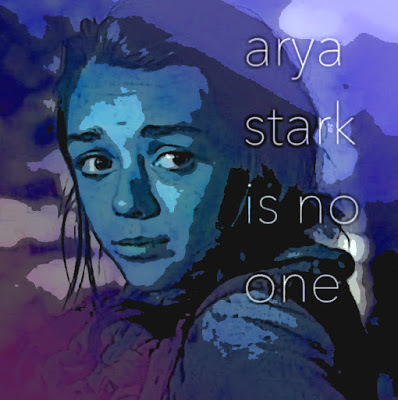
I’m currently having one of those circle of life experiences. TCM is running the 1940 serial Flash Gordon Conquers the Universe at the same time that HBO is about to bring down the curtain on its magnificent Game of Thrones (GOT) series. One marked the dawn of my pop culture engagement…the other its sunset.
As technically clunky as Flash Gordon is, its impact on the Star Wars generation of what some call space operas is undeniable. George Lucas failed to get the rights to remake Flash, but its clear that he drew upon it heavily when he moved on to Star Wars. From the opening prologue scrolling up into infinity...
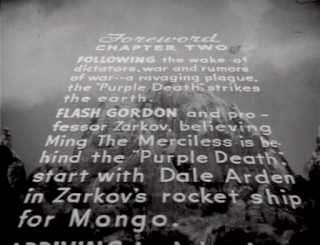 to the exotic casts of characters (Clay People and Tree People to Wookies and Ewoks), to sexy princesses, futuristic costume designs, and the classic battle between good and evil.
to the exotic casts of characters (Clay People and Tree People to Wookies and Ewoks), to sexy princesses, futuristic costume designs, and the classic battle between good and evil. 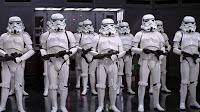 Star Wars Stormtroopers
Star Wars Stormtroopers
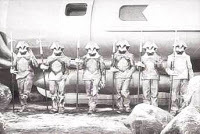 Flash Gordon Annihalatons
Flash Gordon AnnihalatonsThe parallels between Flash and GOT are not as direct…or as they say in Hollywood “on the nose”. Although in the most recent installment I watched, Emperor Ming the Merciless, in an uncharacteristic show of charity, decides to warn his daughter, Princess Aura, now married to his enemy Prince Barin of Arborio, that he’s about to destroy Arborio (and thus, perhaps, deprive Earth of all future risotto). He sends a raven with his message of warning. One of the running jokes for fans of GOT is how fast and efficient ravens are as a means of communication. They seem to transmit battlefield results and palace intrigues better than WiFi. Even better, the raven messengers in Flash Gordon appear capable of interplanetary travel.
More significantly, Flash Gordon, Star Wars, and Game of Thrones all are based on that fundamental human myth that existence in its broadest strokes is an ongoing battle between good and evil. And like rust, evil never sleeps--there will always be Lannisters...there will always be Trumps. Contrary, then, to the near religiously held belief of secular minds law is never settled, rights are never secure, progress is never inevitable. Those prizes are not entitlements, but precious things to be defended and fought for over and over again.
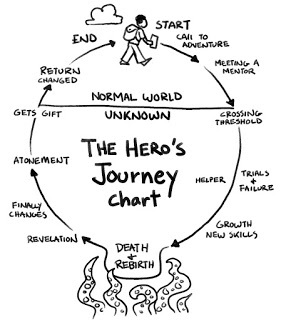 Campbell's monomyth
Campbell's monomythJoseph Campbell--who documented the universal pull of this eternal, organzing myth in what he called the monomyth--always made clear that even at its “end stage”, returning home with the prize, the struggle was not over:
Art, literature, myth and cult, philosophy, and ascetic disciplines are instruments to help the individual past his limiting horizons into spheres of ever expanding realization. As he crosses threshold after threshold, conquering dragon after dragon, the stature of the divinity that he summons to his highest wish increases until it subsumes the cosmos. Finally the mind breaks the bounding sphere of the cosmos to a realization transcending all experience of form—all symbolizations, all divinities: a realization of the ineluctable void.What sets GOT apart from most previous versions of the myth is not the dragons, the nudity, the incest, orgies or blood…though there’s all of that. What distinguishes GOT is that almost all the good, like almost all the bad, arises out of individual character. Whereas in most past primitive or juvenile story tellings, good and bad are clearly delineated and embodied in entities…tribes, states, planets…in GOT it’s all person bound. Almost every character…and there are hundreds of them…acts out of sharp, personal motivation. The creators have taken time to provide each of them…even the worst of them…with method to their madness. Because they have so well planted the idea that human discontent, discord and dysfunction lie at the heart of each individual before becoming manifest in the group, they've cut against the cherished, childish illusion that there is a flag to be captured, a holy grail to be found, a mountain to be conquered that will finally and permanently return humankind to some lost paradise. Having not read the Game of Thrones books and not yet seen the final episodes of the series, I still feel confident in predicting that whoever ends up as ruler of the Seven Kingdoms is going to experience the Iron Throne more as a Throne of Irony. After all the blood and betrayal, the prevailing mood will not be one of ultimate triumph, but of ambivalence, uncertainty, impermanence.
Other than messenger ravens, there’s another corresponding detail linking Flash Gordon to GOT. In his last words to Flash, Ming the Merciless declares, "I am the universe!" But after Flash kills Ming, Dr. Zarkov offers this amendment, "Flash Gordon has conquered the universe". In GOT, Arya Stark spends a long, tortuous time under the tutelage of Jaqen trying to lose her identity. When she masters it and is able to kill her nemesis, Jaqen anoints her with his highest praise, declaring that she has become No One. “A girl is Arya Stark of Winterfell,” she says, correcting him, “And I’m going home.”
In both instances it's the assertion of the ego--the clinical ego, not the conventional ego. But there's a very big difference. Flash Gordon’s ego will soon once again be subsumed by the cosmos…he will go back in service of Planet Earth to fight for truth, justice and the American Way. Arya, on other hand, has crossed Campbell’s bounding sphere of the cosmos. As he writes in Hero with a Thousand Faces:"...Where we had thought to slay another, we shall slay outselves; where we thought to travel outward, we shall come to the center of our own existence; where we thought to be alone, we shall be with all the world."
After leaving Jaqen, we witness Arya sliding in and out of identities and we realize that Arya Stark is now just another mask for her to put on. She has realized the "ineluctable void”, which probably makes her the best suited to sit on the Iron Throne, but also the least likely. Once you become No One, you really don't have any desire to rule over Any One.
Published on April 05, 2019 11:44
No comments have been added yet.



